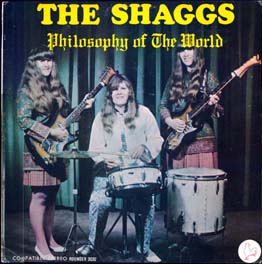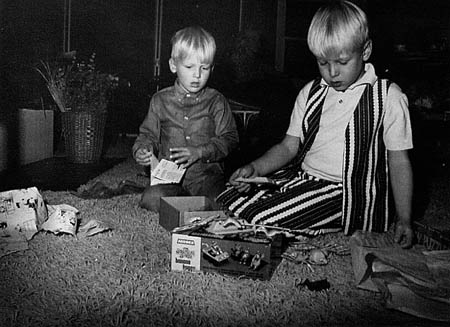 If you let iTunes set up cover art for your tracks, you’ve probably discovered by now that your copy of Led Zeppelin’s “BBC Sessions” has ended up with the cover art to Zepp whiteboy-dreadlock cover band Dread Zeppelin, and that George Harrison’s legendary “All Things Must Pass” is sporting cover art for “The Essential George Gershwin.” And so it was that I came across this image in my iTunes collection recently, associated with some tracks by The Shaggs (we’ll come back to them).
If you let iTunes set up cover art for your tracks, you’ve probably discovered by now that your copy of Led Zeppelin’s “BBC Sessions” has ended up with the cover art to Zepp whiteboy-dreadlock cover band Dread Zeppelin, and that George Harrison’s legendary “All Things Must Pass” is sporting cover art for “The Essential George Gershwin.” And so it was that I came across this image in my iTunes collection recently, associated with some tracks by The Shaggs (we’ll come back to them).
Didn’t know who this dastardly-looking assemblage of unsung hair rockers was, but sure as hell knew it wasn’t The Shaggs. But Shag wasn’t hard to find. Shag sounds pretty much like their picture looks – generic hair rock awash in that fakey “pained” sound, like they’re living in a petrified forest of suffering and loss, approximately as convincing as a bowl of silk flowers in a hotel lobby, having just lost the greatest 14-year-old gum-smacking love of their collective lives.
To confuse matters, there’s another band somewhere in the bowels of the iTunes Music Store called Shagg. Like Shag, Shagg is about as far removed from The Shaggs as World Saxophone Quartet are from John Phillip Sousa. Spacemen 3 from The Kingston Trio. Mogwai from Martin Denny. Shagg sound like a sort of Gong meets Jack Johnson meets King Crimson fusion that failed to escape from the dollar bin. Not terrible, not particularly embarrassing, but a bit genteel, and full of empty lyrics like “One day I was walking down the street / It started to rain / Then I met this cute little girl / She even knew my name …” Blah blah blah.
You probably think you know where I’m going with this. If you do, you’re absolutely brilliant and I want to hire you / have your baby / carjack your great aunt Mavis (circle one), since I have absolutely no idea. It would appear to the naive reader that I’m methodically tearing down this pair of accidental discoveries — Shag and Shagg* — to build to the ineluctable conclusion that The Shaggs were some tremendous rock and roll revelation. You wouldn’t be entirely wrong. Except that it would be a real stretch to say that The Shaggs rocked.
*Shag → Shagg → Shaggs – decline the verb, if you’ve got the grapes.
[audio:http://stuckbetweenstations.org/wp-content/uploads/2007/03/shaggs-sports-car.mp3]
Excerpt from “That Little Sports Car.” Click to play.
 Skip backwards 30 years. If Shag is bad for being predictable, The Shaggs were bad because they were totally, unapologetically, sincerely naive. Art brut in the truest sense of the term. They meant what they played and played what they meant. The Shaggs didn’t let the fact that they had only completed a few music lessons stop them from recording their first album. They didn’t let the fact that they seemed completely unexposed to the entire universe of recorded music stop them. They didn’t let trivial things like rhythm or melody stop them. They just wrote from the heart, unimportant details like “grace” be damned. And that’s not really bad. Not in the way that Shag are bad, anyway.
Skip backwards 30 years. If Shag is bad for being predictable, The Shaggs were bad because they were totally, unapologetically, sincerely naive. Art brut in the truest sense of the term. They meant what they played and played what they meant. The Shaggs didn’t let the fact that they had only completed a few music lessons stop them from recording their first album. They didn’t let the fact that they seemed completely unexposed to the entire universe of recorded music stop them. They didn’t let trivial things like rhythm or melody stop them. They just wrote from the heart, unimportant details like “grace” be damned. And that’s not really bad. Not in the way that Shag are bad, anyway.
It would be so easy to do the So-Bad-It’s-Good thing with the Shaggs. But this trio of New Hampshire sisters transcended that category (“What the hell do they do in small New Hampshire towns … scramble radio signals?” asked one reviewer). The Shaggs rise to a different occassion. They’re certainly not “good” by any traditional standards. This is probably some of the most wooden, tuneless, a-rythmic music you’ll ever hear. But neither are they bad. Or, at least not bad in the way that Shag is bad.
Lester Bangs said that The Shaggs’ first album, “Philosophy of the World,” was “A landmark in rock and roll history.” The Spin Alternative Record Guide says that Philosophy “behaves as if pop conventions of structure, tonality, rhythm, meter, and harmony never existed.” The New York Times goes all the way: “Philosophy was maybe the best worst rock album ever made.” Their producer/daddy Austin Wiggin, Jr. said at the time, “[The Shaggs] are real, pure, and unaffected by outside influences. Their music is different; it is theirs alone.” But the great jazz composer Carla Bley summed it up best: “They bring my mind to a complete halt.” So true.
The Shaggs’ recorded output is mind-numbingly, bone-jarringly, fantastically bad. But unlike Shag, The Shaggs were totally un-self-conscious. They weren’t trying to climb the heavy metal charts, or “get boys,” or shatter boundaries, or even make great art. They just wrote and sang and played from some place so real that most of us would have no idea how to get there. Even if we tried.
Think of the most embarrassingly sincere Hallmark card you’ve ever received, and crank its saccharine quotient up to ten. Now imagine yourself writing that card with absolutely no awareness that it will be perceived as corny by its recipient. Now you’re starting to walk in The Shaggs’ shoes. It takes a very special kind of mind to get there. A special way of being completely removed from culture and “cool” to pack a moral message into every stanza while playing music so herky-jerky and stilted — and yet so totally gonzo — that most garage bands would be stultified if they so much as tried to reproduce the sound.
Oh, the rich people want what the poor people’s got
And the poor people want what the rich people’s got
And the skinny people want what the fat people’s got
And the fat people want what the skinny people’s got
That’s truth, man. Raw, un-shiny, unprocessed truth. Turbinado sugar. Maple syrup sucked straight outta the trunk with a bamboo straw so it drizzles down your chin and onto your terry Kensington. Shag can’t do that. Shagg can’t do that. But The Shaggs? Oh, baby, The Shaggs can do that. Bring your mind to a complete halt. And in the end, isn’t that what we all really want?
Coda: The iTunes genre associated with my entire Shaggs collection is “Tardcore.” And I honestly don’t remember whether I set that genre myself in a moment of rare lucidity, or whether I downloaded the tracks that way. But I did look it up:
Tardcore
Noun: Someone who seems completely ignorant or idiotic in method, speech, or action, but is surprisingly capable of amazing feats.
Since I already own a couple of Shaggs discs, I probably didn’t download the tracks, but ripped them, which can only mean I set the genre myself without remembering. Which would be understandable if my mind was, indeed, at a complete halt. As it probably was.

While The Shaggs were recording “Philosophy,” I was a 6-year-old boy, assembling a Snap-Tite Banana Splits model in a polyester leisure suit while lounging on a gen-yoo-ine shag rug.
Encountered a glorious iTunes train wreck? Let us know.
Last.fm takes this a step further, and it confuses any bands with the same name, mixing their play stats into one, and with a wiki entry that may clarify that there is more than one band by this name, but doesn’t disambiguate the bands into separate pages becasue it relies on the band name in song tags to pull the bios.
The stats part of it makes it pretty confusing to figure out what songs are what. Also this confuses the social networking since listeners to bands by the same name get lumped together.
It also has a nasty way of confusing songs with the same title by the same artist that appear on different releases.
So, a copy of the Velvet Underground’s last third album offers a sample of After Hours from the playlist, and suggests the song is in their radio rotations.
But, instead of the original version, which is to me all about the fragility of Mo Tucker’s gentle voice, I get a hard rockin’ version sung by Lou Reed, apparently from a later live album. And while it’s playing I see the album cover from VU’s third. Very disorienting.
I’ve seen this a few times, even with it playing remixes instead of the original, such as a reggae version of Pink Floyd’s Fearless that apparently showed up on a later collection, Works. And the shout out page they have for each song doesn’t disambiguate either, so you have no clue which version the comments are raving about.
Wow. Just goes to show that even with our wonderful relational databases and tons of human involvement, systems that seem pretty intelligent on the surface are really just dumb automatons after all, and artificial intelligence is still the impossible holy grail.
The lyrics you highlight are from a tongue-in-cheek song, suckah! But thanks for the nice artist comparisons. One man’s dollar bin is another man’s desert island disc.
I agree that the iTunes and Last.fm databases leave something to be desired.